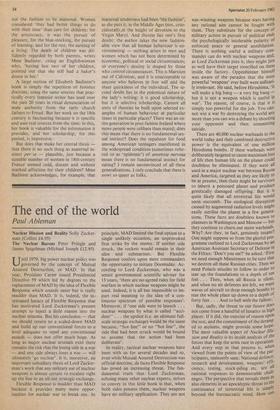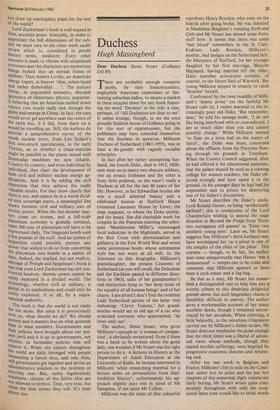The end of the world
Paul Ableman
Until 1979, big power nuclear policy was V governed by the concept of Mutual Assured Destruction, or MAD. In that year, President Carter issued Presidential Directive 59 which led by degrees to the replacement of MAD by the idea of Flexible Response which sounds saner but is really madder than MAD. It is, indeed, the in- spissated lunacy of Flexible Response that has motivated Lord Zuckerman's present attempt to inject a little reason into the nuclear miasma. But his conclusion — that we should return to a scaled-down MAD and build up our conventional forces to a level adequate to repel any conventional assault — does not offer much hope. As long as major nuclear arsenals exist there remains the risk that the losing side in a war — and one side always loses a war — will ultimately 'go nuclear'. It is, moreover, an important subsidiary thesis of Lord Zucker- man's work that any military use of nuclear weapons is almost certain to escalate right up the line to an all-out strategic exchange.
Flexible Response is madder than MAD because it provides many more oppor- tunities for nuclear war to break out. In principle, MAD limited the final option to a single unlikely occasion, an unprovoked first strike by the enemy. If neither side struck, the rockets would remain in their silos and submarines. But Flexible Response confers upon mere commanders the opportunity to initiate Doomsday. Ac- cording to Lord Zuckerman, who was a senior governmental scientific adviser for 13 years, 'there are no agreed rules for field warfare in which nuclear weapons might be used. Indeed, it is all but impossible to im- part real meaning to the idea of a con- tinuous spectrum of possible responses'. Moreover, if 'one side were to launch . . nuclear weapons by what is called "acci- dent" . . . the upshot (i.e. an ultimate full- scale strategic exchange) would be the same because, "hot line" or no "hot line", the side that had been struck would be bound to assume that the action had been deliberate'.
In reality, tactical nuclear weapons have been with us for several decades and so, even while Mutual Assured Destruction was official doctrine, de facto Flexible Response has posed an increasing threat. The fun- damental truth that Lord Zuckerman, echoing many other nuclear experts, strives to convey in this little book is that, when both sides possess them, nuclear weapons have no military application. They are not
war-winning weapons because wars having any rational aim cannot be fought with them. They substitute for the concept of military action in pursuit of political ends the psychologically intolerable polarity of enforced peace or general annihilation. There is nothing useful a military com- mander can do with nuclear weapons and, as Lord Zuckerman puts it, they might just as well have their target stencilled on them inside the factory. OppenWeimer himself was aware of the paradox that the most powerful 'weapons' ever built were militari- ly irrelevant. He said, before Hiroshima, 'it will make a big bang — a very big bang — but it is not a weapon which is useful in war'. The reason, of course, is that it is simply too powerful for the job. You can- not win a war by destroying the world anY more than you can win a debate by shooting your opponent and then committing suicide.
There are 40,000 nuclear warheads in the world today and their combined destructive power is the equivalent of one million Hiroshima bombs. If these warheads were deliberately targeted to cause maximum loss of life then human life on the planet could doubtless be eliminated. If they were all used in a major nuclear war between Russia and America, targeted as they are likely to be at present, then there might be survivors to inherit a poisoned planet and produce genetically damaged offspring. But it is quite likely that all terrestrial life would soon succomb. The ecological disruption caused by augmented radiation levels might easily sterilise the planet in a few genera- tions. These facts are doubtless known to planners in Washington and Moscow — but they continue to churn out more warheads. Why? Are they, in fact, genuinely insane? One might suppose so from the gleeful pro- gramme outlined to Lord Zuckerman by an American Assistant Secretary of Defense in the Fifties: 'Don't you see?' he asked. 'First we need enough Minutemen to be sure that we destroy all those Russian cities. Then we need Polaris missiles to follow in order to tear up the foundations to a depth of ten feet . . . Then, when all Russia is silent, and when no air defences are left, we want waves of aircraft to drop enough bombs to tear the whole place up down to a depth of forty feet . . . And to hell with the fallout.'
But, sadly, the threat to our future does not come from a handful of lunatics in high places. If it did, the exercise of reason upon the rest, and the commitment of the derang- ed to asylums, might provide some hope. The most valuable aspect of Nuclear Illu- sion and Reality is its inside analysis of the forces that keep the arms race in operation. And every step in that process is, when viewed from the points of view of the par- ticipants, eminently sane. National defence, research and development, weapons' effi- ciency, testing, stock-piling etc. are all rational responses to demonstrable chall- enges. The perspective that reveals them as also elements in an apocalyptic threat to the continuance of terrestrial life is simP1Y beyond the bureaucratic mind. How can
you draw up contingency plans for the end of the world?
Lord Zuckerman's book is well-argued in firm, accurate prose. Ironically, in order to appreciate the full dimensions of the sub- ject we must turn to the other work under review which is, considered in purely literary terms, mediocre. Every other sentence is made to vibrate with sensational overtones and the characters are mysterious beings locked into an eternal frame of epithets. Thus Amory Lovins, an American energy expert, is forever 'slim, ashen-faced and rather dishevelled . . .'. The authors betray, in unguarded moments, abysmal ignorance of elementary physics, apparent- ly believing that an American melted down reactor core would really sink through the globe and emerge in China. In fact, the core would never get anywhere near the centre of the earth but, if it did, from there on it would be travelling up. Still, the authors do provide a comprehensive survey of the whole nuclear story, from Leo Szilard's first awe-struck speculations, in the early Thirties, as to whether a chain-reaction might be possible to the planet mined with Doomsday machines we now inhabit. country by country, and even individual by Individual, they chart the development of both civil and military nuclear energy ap- plications. And it is by adding the civil dimension that they achieve the really valuable results. For they show clearly that there is not, and cannot be in a world divid- ed into sovereign states, a meaningful line drawn between civil and military uses of atomic power. When the fast-breeder reac- tors come on stream, and a full-scale Plutonium economy is globally initiated, some 100 tons of plutonium will have to be reprocessed daily. The Nagasaki bomb used few pounds of the stuff. And no system of inspection could possibly prevent any power that wished to do so from converting the Plutonium into bombs in a matter of days. Indeed, the implied, but not explicit, Message of Pringle and Spigelman's book is one that even Lord Zuckerman has not con- fronted head-on. Atomic power cannot be safely deployed in a divided world. The technology, whether civil or military, is global in its implications and could only be safely exploited, if at all, by a supra- national authority.
The truth is that the world is not ready for the atom. But since it is precociously with us, what should we do? We should. Protest and it matters less on what grounds than in what numbers. Governments and their policies have brought about our pre- sent peril and it is up to governments, not citizens, to formulate policies that will remove it. When city centres throughout the world are daily thronged with people demanding a future then, and only then, will governments get together and devise an administrative solution to the problem of ensuring one. But, sanity lugubriously Maintains, citizens of the Soviet bloc are not allowed to protest. True, very true, but when the time comes they will. It's their Planet too.







































 Previous page
Previous page